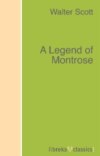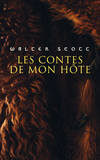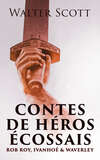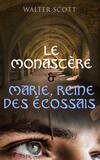Loe raamatut: «A Legend of Montrose»
Titel: A Legend of Montrose
von William Shakespeare, H. G. Wells, Henry Van Dyke, Thomas Carlyle, Oscar Wilde, Joseph Conrad, Henry James, Anthony Hope, Henry Fielding, Giraldus Cambrensis, Daniel Defoe, Grammaticus Saxo, Edgar Rice Burroughs, Hugh Lofting, Agatha Christie, Sinclair Lewis, Eugène Brieux, Upton Sinclair, Booth Tarkington, Sax Rohmer, Jack London, Anna Katharine Green, Sara Jeannette Duncan, Xenophon, Alexandre Dumas père, John William Draper, Alice Christiana Thompson Meynell, Bram Stoker, Honoré de Balzac, William Congreve, Louis de Rougemont, Nikolai Vasilievich Gogol, Rolf Boldrewood, François Rabelais, Lysander Spooner, B. M. Bower, Henry Rider Haggard, William Hickling Prescott, Lafcadio Hearn, Robert Herrick, Jane Austen, Mark Twain, Mary Roberts Rinehart, Charles Babbage, Kate Douglas Smith Wiggin, Frank L. Packard, George Meredith, John Merle Coulter, Irvin S. Cobb, Edwin Mims, John Tyndall, Various, Charles Darwin, Sidney Lanier, Henry Lawson, Niccolò Machiavelli, George W. Crile, Théophile Gautier, Noah Brooks, James Thomson, Zane Grey, J. M. Synge, Virginia Woolf, Conrad Aiken, Edna St. Vincent Millay, Helen Cody Wetmore, Ayn Rand, Sir Thomas Malory, Gustave Flaubert, Edmond Rostand, Charlotte Brontë, Edith Wharton, Giles Lytton Strachey, Myrtle Reed, Ernest Bramah, Jules Verne, H. L. Mencken, H. Stanley Redgrove, Victor Lefebure, Edna Lyall, John Masefield, Charles Kingsley, Robert Burns, Edgar Lee Masters, Victor [pseud.] Appleton, Ellis Parker Butler, Mary Lamb, Charles Lamb, Johann Wolfgang von Goethe, Kenneth Grahame, Charles Dickens, John Ruskin, John Galt, James J. Davis, Owen Wister, William Blades, Sir Hall Caine, Sir Max Beerbohm, Baron Edward John Moreton Drax Plunkett Dunsany, Bret Harte, E. Phillips Oppenheim, Thomas Henry Huxley, A. B. Paterson, John N. Reynolds, Walter Dill Scott, Hans Gustav Adolf Gross, T. S. Eliot, Walt Whitman, Arthur Ransome, Jane Addams, Elizabeth, David Lindsay, Helen Bannerman, Charles A. Oliver, J. M. Barrie, Robert F. Murray, Andrew Lang, Jerome K. Jerome, Francis Thompson, Sydney Waterlow, Andrew Dickson White, Benjamin N. Cardozo, Karl Marx, Edouard Louis Emmanuel Julien Le Roy, Margaret Hill McCarter, Sir Donald Mackenzie Wallace, Howard Trueman, L. M. Montgomery, Frank T. Bullen, Baron Alfred Tennyson Tennyson, Jonathan Nield, Henry Wadsworth Longfellow, Charles Reade, Ouida, Washington Irving, Benjamin Louis Eulalie de Bonneville, Sir Walter Scott, Stewart Edward White, Arthur Hugh Clough, Baron Edward Bulwer Lytton Lytton, C.-F. Volney, T. Troward, graf Leo Tolstoy, Christopher Morley, James Madison, Alexander Hamilton, John Jay, Gilbert White, Percival Lowell, Frederick Marryat, Robert Graves, Thomas Holmes, Wilkie Collins, Maria Edgeworth, Katherine Mansfield, E. Nesbit, Olive Schreiner, Jeronimo Lobo, O. Henry, James Slough Zerbe, Donald Ogden Stewart, Johanna Spyri, Eleanor H. Porter, William Tatem Tilden, Sol Plaatje, Rafael Sabatini
ISBN 978-3-7429-1405-7
Alle Rechte vorbehalten.
Es ist ohne vorherige schriftliche Erlaubnis nicht gestattet, dieses Werk im Ganzen oder in Teilen zu vervielfältigen oder zu veröffentlichen.
A LEGEND OF MONTROSE
by
Sir Walter Scott
Contents
| I. INTRODUCTION TO A LEGEND OF MONTROSE. II. INTRODUCTION (Supplement). III. A LEGEND OF MONTROSE. CHAPTER I. CHAPTER II. CHAPTER III. CHAPTER IV. CHAPTER V. CHAPTER VI. CHAPTER VII. CHAPTER VIII. CHAPTER IX. CHAPTER X. CHAPTER XI. CHAPTER XII. CHAPTER XIII. CHAPTER XIV. CHAPTER XV. CHAPTER XVI. CHAPTER XVII. CHAPTER XVIII. CHAPTER XIX. CHAPTER XX. CHAPTER XXI. CHAPTER XXII. CHAPTER XXIII. IV. APPENDIX. No. II. V. NOTES. Note I.—FIDES ET FIDUCIA SUNT RELATIVA. Note II.—WRAITHS. |
I. INTRODUCTION TO A LEGEND OF MONTROSE.
The Legend of Montrose was written chiefly with a view to place before the reader the melancholy fate of John Lord Kilpont, eldest son of William Earl of Airth and Menteith, and the singular circumstances attending the birth and history of James Stewart of Ardvoirlich, by whose hand the unfortunate nobleman fell.
Our subject leads us to talk of deadly feuds, and we must begin with one still more ancient than that to which our story relates. During the reign of James IV., a great feud between the powerful families of Drummond and Murray divided Perthshire. The former, being the most numerous and powerful, cooped up eight score of the Murrays in the kirk of Monivaird, and set fire to it. The wives and the children of the ill-fated men, who had also found shelter in the church, perished by the same conflagration. One man, named David Murray, escaped by the humanity of one of the Drummonds, who received him in his arms as he leaped from amongst the flames. As King James IV. ruled with more activity than most of his predecessors, this cruel deed was severely revenged, and several of the perpetrators were beheaded at Stirling. In consequence of the prosecution against his clan, the Drummond by whose assistance David Murray had escaped, fled to Ireland, until, by means of the person whose life he had saved, he was permitted to return to Scotland, where he and his descendants were distinguished by the name of Drummond-Eirinich, or Ernoch, that is, Drummond of Ireland; and the same title was bestowed on their estate.
The Drummond-ernoch of James the Sixth's time was a king's forester in the forest of Glenartney, and chanced to be employed there in search of venison about the year 1588, or early in 1589. This forest was adjacent to the chief haunts of the MacGregors, or a particular race of them, known by the title of MacEagh, or Children of the Mist. They considered the forester's hunting in their vicinity as an aggression, or perhaps they had him at feud, for the apprehension or slaughter of some of their own name, or for some similar reason. This tribe of MacGregors were outlawed and persecuted, as the reader may see in the Introduction to ROB ROY; and every man's hand being against them, their hand was of course directed against every man. In short, they surprised and slew Drummond-ernoch, cut off his head, and carried it with them, wrapt in the corner of one of their plaids.
In the full exultation of vengeance, they stopped at the house of Ardvoirlich and demanded refreshment, which the lady, a sister of the murdered Drummond-ernoch (her husband being absent), was afraid or unwilling to refuse. She caused bread and cheese to be placed before them, and gave directions for more substantial refreshments to be prepared. While she was absent with this hospitable intention, the barbarians placed the head of her brother on the table, filling the mouth with bread and cheese, and bidding him eat, for many a merry meal he had eaten in that house.
The poor woman returning, and beholding this dreadful sight, shrieked aloud, and fled into the woods, where, as described in the romance, she roamed a raving maniac, and for some time secreted herself from all living society. Some remaining instinctive feeling brought her at length to steal a glance from a distance at the maidens while they milked the cows, which being observed, her husband, Ardvoirlich, had her conveyed back to her home, and detained her there till she gave birth to a child, of whom she had been pregnant; after which she was observed gradually to recover her mental faculties.
Meanwhile the outlaws had carried to the utmost their insults against the regal authority, which indeed, as exercised, they had little reason for respecting. They bore the same bloody trophy, which they had so savagely exhibited to the lady of Ardvoirlich, into the old church of Balquidder, nearly in the centre of their country, where the Laird of MacGregor and all his clan being convened for the purpose, laid their hands successively on the dead man's head, and swore, in heathenish and barbarous manner, to defend the author of the deed. This fierce and vindictive combination gave the author's late and lamented friend, Sir Alexander Boswell, Bart., subject for a spirited poem, entitled "Clan-Alpin's Vow," which was printed, but not, I believe, published, in 1811 [See Appendix No. I].
The fact is ascertained by a proclamation from the Privy Council, dated 4th February, 1589, directing letters of fire and sword against the MacGregors [See Appendix No. II]. This fearful commission was executed with uncommon fury. The late excellent John Buchanan of Cambusmore showed the author some correspondence between his ancestor, the Laird of Buchanan, and Lord Drummond, about sweeping certain valleys with their followers, on a fixed time and rendezvous, and "taking sweet revenge for the death of their cousin, Drummond-ernoch." In spite of all, however, that could be done, the devoted tribe of MacGregor still bred up survivors to sustain and to inflict new cruelties and injuries.
[I embrace the opportunity given me by a second mention of this tribe, to notice an error, which imputes to an individual named Ciar Mohr MacGregor, the slaughter of the students at the battle of Glenfruin. I am informed from the authority of John Gregorson, Esq., that the chieftain so named was dead nearly a century before the battle in question, and could not, therefore, have done the cruel action mentioned. The mistake does not rest with me, as I disclaimed being responsible for the tradition while I quoted it, but with vulgar fame, which is always disposed to ascribe remarkable actions to a remarkable name.—See the erroneous passage, ROB ROY, Introduction; and so soft sleep the offended phantom of Dugald Ciar Mohr.
It is with mingled pleasure and shame that I record the more important error, of having announced as deceased my learned acquaintance, the Rev. Dr. Grahame, minister of Aberfoil.—See ROB ROY, p.360. I cannot now recollect the precise ground of my depriving my learned and excellent friend of his existence, unless, like Mr. Kirke, his predecessor in the parish, the excellent Doctor had made a short trip to Fairyland, with whose wonders he is so well acquainted. But however I may have been misled, my regret is most sincere for having spread such a rumour; and no one can be more gratified than I that the report, however I have been induced to credit and give it currency, is a false one, and that Dr. Grahame is still the living pastor of Aberfoil, for the delight and instruction of his brother antiquaries.]
Meanwhile Young James Stewart of Ardvoirlich grew up to manhood uncommonly tall, strong, and active, with such power in the grasp of his hand in particular, as could force the blood from beneath the nails of the persons who contended with him in this feat of strength. His temper was moody, fierce, and irascible; yet he must have had some ostensible good qualities, as he was greatly beloved by Lord Kilpont, the eldest son of the Earl of Airth and Menteith.
This gallant young nobleman joined Montrose in the setting up his standard in 1644, just before the decisive battle at Tippermuir, on the 1st September in that year. At that time, Stewart of Ardvoirlich shared the confidence of the young Lord by day, and his bed by night, when, about four or five days after the battle, Ardvoirlich, either from a fit of sudden fury or deep malice long entertained against his unsuspecting friend, stabbed Lord Kilpont to the heart, and escaped from the camp of Montrose, having killed a sentinel who attempted to detain him. Bishop Guthrie gives us a reason for this villainous action, that Lord Kilpont had rejected with abhorrence a proposal of Ardvoirlich to assassinate Montrose. But it does not appear that there is any authority for this charge, which rests on mere suspicion. Ardvoirlich, the assassin, certainly did fly to the Covenanters, and was employed and promoted by them. He obtained a pardon for the slaughter of Lord Kilpont, confirmed by Parliament in 1634, and was made Major of Argyle's regiment in 1648. Such are the facts of the tale here given as a Legend of Montrose's wars. The reader will find they are considerably altered in the fictitious narrative.
The author has endeavoured to enliven the tragedy of the tale by the introduction of a personage proper to the time and country. In this he has been held by excellent judges to have been in some degree successful. The contempt of commerce entertained by young men having some pretence to gentility, the poverty of the country of Scotland, the national disposition to wandering and to adventure, all conduced to lead the Scots abroad into the military service of countries which were at war with each other. They were distinguished on the Continent by their bravery; but in adopting the trade of mercenary soldiers, they necessarily injured their national character. The tincture of learning, which most of them possessed, degenerated into pedantry; their good breeding became mere ceremonial; their fear of dishonour no longer kept them aloof from that which was really unworthy, but was made to depend on certain punctilious observances totally apart from that which was in itself deserving of praise. A cavalier of honour, in search of his fortune, might, for example, change his service as he would his shirt, fight, like the doughty Captain Dalgetty, in one cause after another, without regard to the justice of the quarrel, and might plunder the peasantry subjected to him by the fate of war with the most unrelenting rapacity; but he must beware how he sustained the slightest reproach, even from a clergyman, if it had regard to neglect on the score of duty. The following occurrence will prove the truth of what I mean:—
"Here I must not forget the memory of one preacher, Master William Forbesse, a preacher for souldiers, yea, and a captaine in neede to leade souldiers on a good occasion, being full of courage, with discretion and good conduct, beyond some captaines I have knowne, that were not so capable as he. At this time he not onely prayed for us, but went on with us, to remarke, as I thinke, men's carriage; and having found a sergeant neglecting his dutie and his honour at such a time (whose name I will not expresse), having chidden him, did promise to reveale him unto me, as he did after their service. The sergeant being called before me, and accused, did deny his accusation, alleaging, if he were no pasteur that had alleaged it, he would not lie under the injury, The preacher offered to fight with him, [in proof] that it was truth he had spoken of him; whereupon I cashiered the sergeant, and gave his place to a worthier, called Mungo Gray, a gentleman of good worth, and of much courage. The sergeant being cashiered, never called Master William to account, for which he was evill thought of; so that he retired home, and quit the warres."
The above quotation is taken from a work which the author repeatedly consulted while composing the following sheets, and which is in great measure written in the humour of Captain Dugald Dalgetty. It bears the following formidable title:—"MONRO his Expedition with the worthy Scots Regiment, called MacKeye's Regiment, levied in August 1626, by Sir Donald MacKeye Lord Rees Colonel, for his Majestie's service of Denmark, and reduced after the battle of Nerling, in September 1634, at Wormes, in the Palz: Discharged in several duties and observations of service, first, under the magnanimous King of Denmark, during his wars against the Empire; afterwards under the invincible King of Sweden, during his Majestie's lifetime; and since under the Director-General, the Rex-Chancellor Oxensterne, and his Generals: collected and gathered together, at spare hours, by Colonel Robert Monro, as First Lieutenant under the said Regiment, to the noble and worthy Captain Thomas MacKenzie of Kildon, brother to the noble Lord, the Lord Earl of Seaforth, for the use of all noble Cavaliers favouring the laudable profession of arms. To which is annexed, the Abridgement of Exercise, and divers Practical Observations for the Younger Officer, his consideration. Ending with the Soldier's Meditations on going on Service."—London, 1637.
Another worthy of the same school, and nearly the same views of the military character, is Sir James Turner, a soldier of fortune, who rose to considerable rank in the reign of Charles II., had a command in Galloway and Dumfries-shire, for the suppression of conventicles, and was made prisoner by the insurgent Covenanters in that rising which was followed by the battle of Pentland. Sir James is a person even of superior pretensions to Lieutenant-Colonel Monro, having written a Military Treatise on the Pike-Exercise, called "Pallas Armata." Moreover, he was educated at Glasgow College, though he escaped to become an Ensign in the German wars, instead of taking his degree of Master of Arts at that learned seminary.
In latter times, he was author of several discourses on historical and literary subjects, from which the Bannatyne Club have extracted and printed such passages as concern his Life and Times, under the title of SIR JAMES TURNER'S MEMOIRS. From this curious book I extract the following passage, as an example of how Captain Dalgetty might have recorded such an incident had he kept a journal, or, to give it a more just character, it is such as the genius of De Foe would have devised, to give the minute and distinguishing features of truth to a fictitious narrative:—
"Heere I will set doun ane accident befell me; for thogh it was not a very strange one, yet it was a very od one in all its parts. My tuo brigads lay in a village within halfe a mile of Applebie; my own quarter was in a gentleman's house, ho was a Ritmaster, and at that time with Sir Marmaduke; his wife keepd her chamber readie to be brought to bed. The castle being over, and Lambert farre enough, I resolved to goe to bed everie night, haveing had fatigue enough before. 'The first night I sleepd well enough; and riseing nixt morning, I misd one linnen stockine, one halfe silke one, and one boothose, the accoustrement under a boote for one leg; neither could they be found for any search. Being provided of more of the same kind, I made myselfe reddie, and rode to the head-quarters. At my returne, I could heare no news of my stockins. That night I went to bed, and nixt morning found myselfe just so used; missing the three stockins for one leg onlie, the other three being left intire as they were the day before. A narrower search then the first was made, bot without successe. I had yet in reserve one paire of whole stockings, and a paire of boothose, greater then the former. These I put on my legs. The third morning I found the same usage, the stockins for one leg onlie left me. It was time for me then, and my servants too, to imagine it must be rats that had shard my stockins so inequallie with me; and this the mistress of the house knew well enough, but would not tell it me. The roome, which was a low parlour, being well searched with candles, the top of my great boothose was found at a hole, in which they had drawne all the rest. I went abroad and ordered the boards to be raised, to see how the rats had disposed of my moveables. The mistress sent a servant of her oune to be present at this action, which she knew concerned her. One board being bot a litle opend, a litle boy of mine thrust in his hand, and fetchd with him foure and tuentie old peeces of gold, and one angell. The servant of the house affirmed it appertained to his mistres. The boy bringing the gold to me, I went immediatlie to the gentlewomans chamber, and told her, it was probable Lambert haveing quarterd in that house, as indeed he had, some of his servants might have hid that gold; and if so, it was lawfullie mine; bot if she could make it appeare it belongd to her, I should immediatlie give it her. The poore gentlewoman told me with many teares, that her husband being none of the frugallest men (and indeed he was a spendthrift), she had hid that gold without his, knowledge, to make use of it as she had occasion, especiallie when she lay in; and conjured me, as I lovd the King (for whom her husband and she had suffered much), not to detaine her gold. She said, if there was either more or lesse then foure and tuentie whole peeces, and two halfe ones, it sould be none of hers; and that they were put by her in a red velvet purse. After I had given her assureance of her gold, a new search is made, the other angell is found, the velvet purse all gnawd in bits, as my stockins were, and the gold instantlie restord to the gentlewoman. I have often heard that the eating or gnawing of cloths by rats is ominous, and portends some mischance to fall on those to whom the cloths belong. I thank God I was never addicted to such divinations, or heeded them. It is true, that more misfortunes then one fell on me shortlie after; bot I am sure I could have better forseene them myselfe then rats or any such vermine, and yet did it not. I have heard indeed many fine stories told of rats, how they abandon houses and ships, when the first are to be burnt and the second dround. Naturalists say they are very sagacious creatures, and I beleeve they are so; bot I shall never be of the opinion they can forsee future contingencies, which I suppose the divell himselfe can neither forknow nor fortell; these being things which the Almightie hath keepd hidden in the bosome of his divine prescience. And whither the great God hath preordained or predestinated these things, which to us are contingent, to fall out by ane uncontrollable and unavoidable necessitie, is a question not yet decided." [SIR JAMES TURNER'S MEMOIRS, Bannatyne edition, p. 59.]
In quoting these ancient authorities, I must not forget the more modern sketch of a Scottish soldier of the old fashion, by a masterhand, in the character of Lesmahagow, since the existence of that doughty Captain alone must deprive the present author of all claim to absolute originality. Still Dalgetty, as the production of his own fancy, has been so far a favourite with its parent, that he has fallen into the error of assigning to the Captain too prominent a part in the story. This is the opinion of a critic who encamps on the highest pinnacles of literature; and the author is so far fortunate in having incurred his censure, that it gives his modesty a decent apology for quoting the praise, which it would have ill-befited him to bring forward in an unmingled state. The passage occurs in the EDINBURGH REVIEW, No. 55, containing a criticism on IVANHOE:—
"There is too much, perhaps, of Dalgetty,—or, rather, he engrosses too great a proportion of the work,—for, in himself, we think he is uniformly entertaining;—and the author has nowhere shown more affinity to that matchless spirit who could bring out his Falstaffs and his Pistols, in act after act, and play after play, and exercise them every time with scenes of unbounded loquacity, without either exhausting their humour, or varying a note from its characteristic tone, than in his large and reiterated specimens of the eloquence of the redoubted Ritt-master. The general idea of the character is familiar to our comic dramatists after the Restoration—and may be said in some measure to be compounded of Captain Fluellen and Bobadil;—but the ludicrous combination of the SOLDADO with the Divinity student of Mareschal-College, is entirely original; and the mixture of talent, selfishness, courage, coarseness, and conceit, was never so happily exemplified. Numerous as his speeches are, there is not one that is not characteristic—and, to our taste, divertingly ludicrous."
POSTSCRIPT.
While these pages were passing through the press, the author received a letter from the present Robert Stewart of Ardvoirlich, favouring him with the account of the unhappy slaughter of Lord Kilpont, differing from, and more probable than, that given by Bishop Wishart, whose narrative infers either insanity or the blackest treachery on the part of James Stewart of Ardvoirlich, the ancestor of the present family of that name. It is but fair to give the entire communication as received from my respected correspondent, which is more minute than the histories of the period.
"Although I have not the honour of being personally known to you, I hope you will excuse the liberty I now take, in addressing you on the subject of a transaction more than once alluded to by you, in which an ancestor of mine was unhappily concerned. I allude to the slaughter of Lord Kilpont, son of the Earl of Airth and Monteith, in 1644, by James Stewart of Ardvoirlich. As the cause of this unhappy event, and the quarrel which led to it, have never been correctly stated in any history of the period in which it took place, I am induced, in consequence of your having, in the second series of your admirable Tales on the History of Scotland, adopted Wishart's version of the transaction, and being aware that your having done so will stamp it with an authenticity which it does not merit, and with a view, as far as possible, to do justice to the memory of my unfortunate ancestor, to send you the account of this affair as it has been handed down in the family.
"James Stewart of Ardvoirlich, who lived in the early part of the 17th century, and who was the unlucky cause of the slaughter of Lord Kilpont, as before mentioned, was appointed to the command of one of several independent companies raised in the Highlands at the commencement of the troubles in the reign of Charles I.; another of these companies was under the command of Lord Kilpont, and a strong intimacy, strengthened by a distant relationship, subsisted between them. When Montrose raised the royal standard, Ardvoirlich was one of the first to declare for him, and is said to have been a principal means of bringing over Lord Kilpont to the same cause; and they accordingly, along with Sir John Drummond and their respective followers, joined Montrose, as recorded by Wishart, at Buchanty. While they served together, so strong was their intimacy, that they lived and slept in the same tent.
"In the meantime, Montrose had been joined by the Irish under the command of Alexander Macdonald; these, on their march to join Montrose, had committed some excesses on lands belonging to Ardvoirlich, which lay in the line of their march from the west coast. Of this Ardvoirlich complained to Montrose, who, probably wishing as much as possible to conciliate his new allies, treated it in rather an evasive manner. Ardvoirlich, who was a man of violent passions, having failed to receive such satisfaction as he required, challenged Macdonald to single combat. Before they met, however, Montrose, on the information and by advice, as it is said, of Kilpont, laid them both under arrest. Montrose, seeing the evils of such a feud at such a critical time, effected a sort of reconciliation between them, and forced them to shake hands in his presence; when, it was said, that Ardvoirlich, who was a very powerful man, took such a hold of Macdonald's hand as to make the blood start from his fingers. Still, it would appear, Ardvoirlich was by no means reconciled.
"A few days after the battle of Tippermuir, when Montrose with his army was encamped at Collace, an entertainment was given by him to his officers, in honour of the victory he had obtained, and Kilpont and his comrade Ardvoirlich were of the party. After returning to their quarters, Ardvoirlich, who seemed still to brood over his quarrel with Macdonald, and being heated with drink, began to blame Lord Kilpont for the part he had taken in preventing his obtaining redress, and reflecting against Montrose for not allowing him what he considered proper reparation. Kilpont of course defended the conduct of himself and his relative Montrose, till their argument came to high words; and finally, from the state they were both in, by an easy transition, to blows, when Ardvoirlich, with his dirk, struck Kilpont dead on the spot. He immediately fled, and under the cover of a thick mist escaped pursuit, leaving his eldest son Henry, who had been mortally wounded at Tippermuir, on his deathbed.
"His followers immediately withdrew from Montrose, and no course remained for him but to throw himself into the arms of the opposite faction, by whom he was well received. His name is frequently mentioned in Leslie's campaigns, and on more than one occasion he is mentioned as having afforded protection to several of his former friends through his interest with Leslie, when the King's cause became desperate.




















